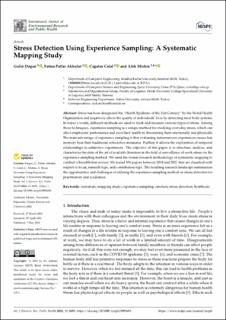| dc.contributor.author | Dogan, Gulin | |
| dc.contributor.author | Akbulut, Fatma Patlar | |
| dc.contributor.author | Catal, Cagatay | |
| dc.contributor.author | Mishra, Alok | |
| dc.date.accessioned | 2024-03-20T12:51:47Z | |
| dc.date.available | 2024-03-20T12:51:47Z | |
| dc.date.created | 2022-04-29T10:25:16Z | |
| dc.date.issued | 2022 | |
| dc.identifier.citation | International Journal of Environmental Research and Public Health (IJERPH). 2022, 19 (9), 5693. | en_US |
| dc.identifier.issn | 1661-7827 | |
| dc.identifier.uri | https://hdl.handle.net/11250/3123412 | |
| dc.description.abstract | Stress has been designated the “Health Epidemic of the 21st Century” by the World Health Organization and negatively affects the quality of individuals’ lives by detracting most body systems. In today’s world, different methods are used to track and measure various types of stress. Among these techniques, experience sampling is a unique method for studying everyday stress, which can affect employees’ performance and even their health by threatening them emotionally and physically. The main advantage of experience sampling is that evaluating instantaneous experiences causes less memory bias than traditional retroactive measures. Further, it allows the exploration of temporal relationships in subjective experiences. The objective of this paper is to structure, analyze, and characterize the state of the art of available literature in the field of surveillance of work stress via the experience sampling method. We used the formal research methodology of systematic mapping to conduct a breadth-first review. We found 358 papers between 2010 and 2021 that are classified with respect to focus, research type, and contribution type. The resulting research landscape summarizes the opportunities and challenges of utilizing the experience sampling method on stress detection for practitioners and academics. | en_US |
| dc.language.iso | eng | en_US |
| dc.relation.uri | https://doi.org/10.3390/ijerph19095693 | |
| dc.rights | Navngivelse 4.0 Internasjonal | * |
| dc.rights.uri | http://creativecommons.org/licenses/by/4.0/deed.no | * |
| dc.title | Stress detection using experience sampling : a systematic mapping study | en_US |
| dc.type | Peer reviewed | en_US |
| dc.type | Journal article | en_US |
| dc.description.version | publishedVersion | en_US |
| dc.source.volume | 19 | en_US |
| dc.source.journal | International Journal of Environmental Research and Public Health (IJERPH) | en_US |
| dc.source.issue | 9 | en_US |
| dc.identifier.doi | 10.3390/ijerph19095693 | |
| dc.identifier.cristin | 2020031 | |
| dc.source.articlenumber | 5693 | en_US |
| cristin.ispublished | true | |
| cristin.fulltext | original | |
| cristin.qualitycode | 1 | |

